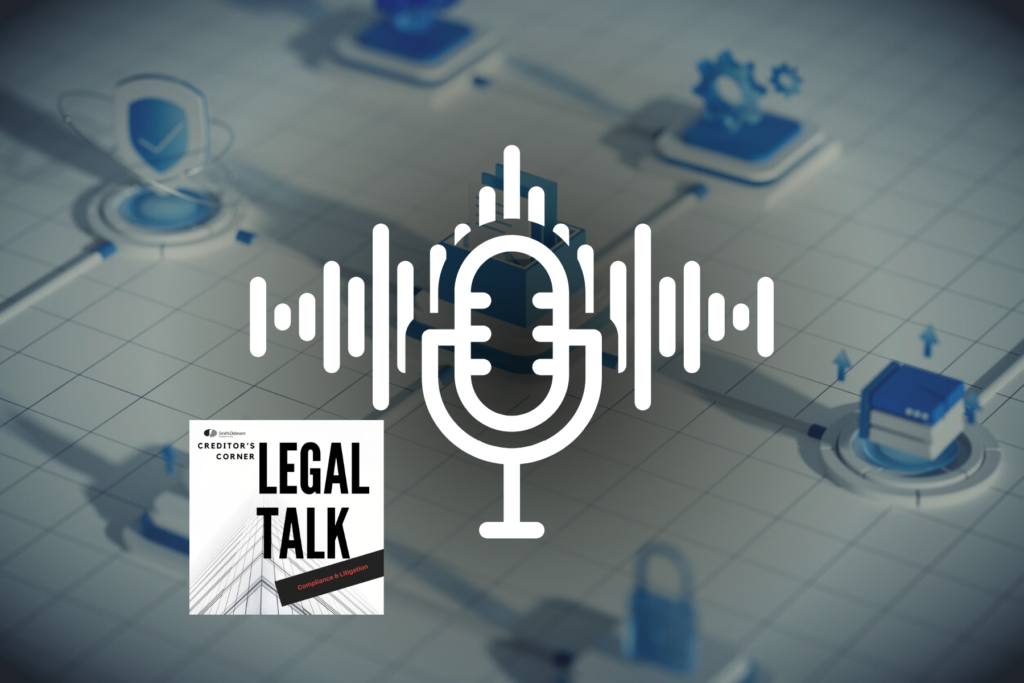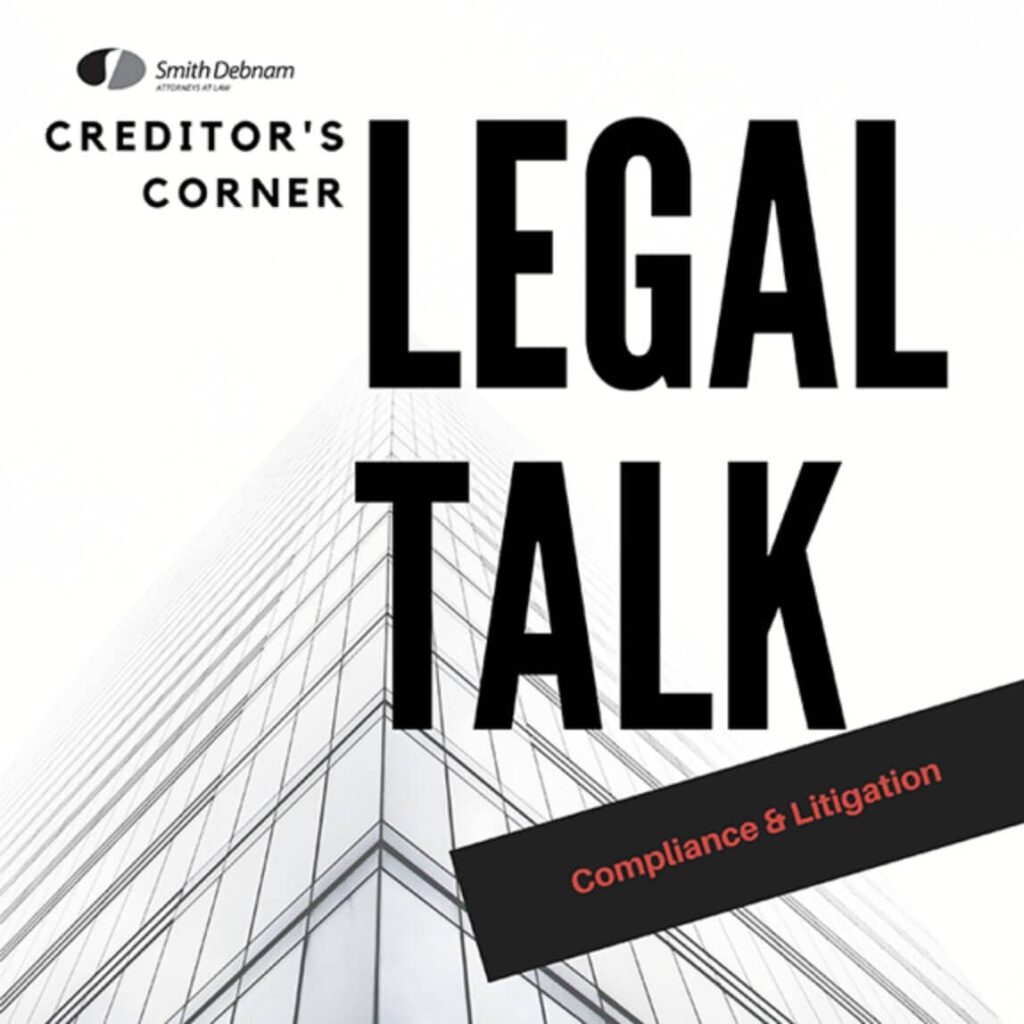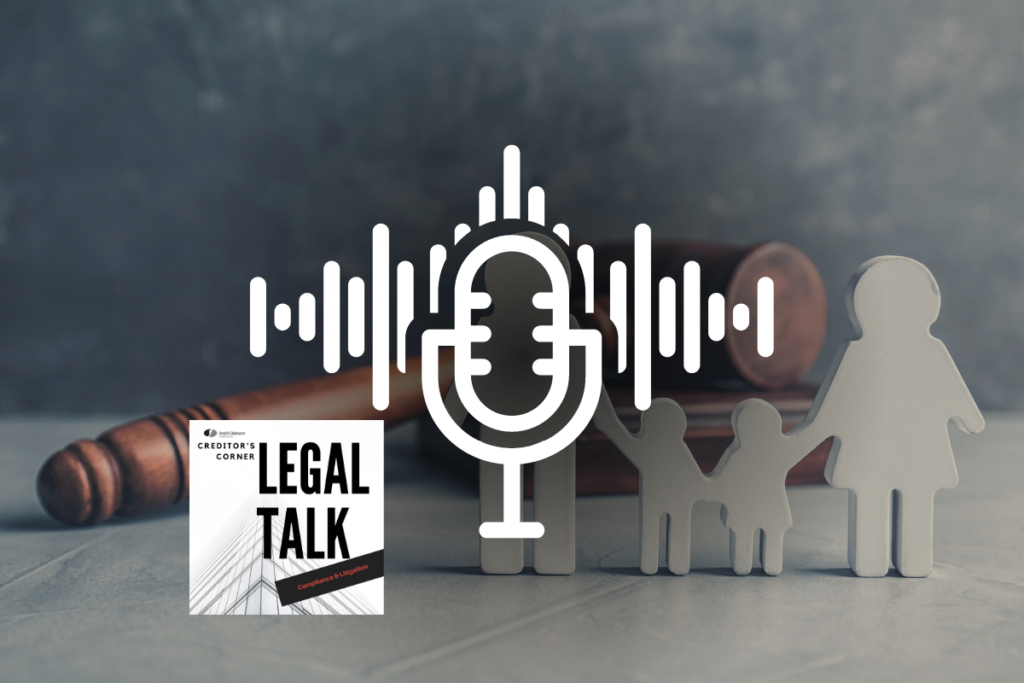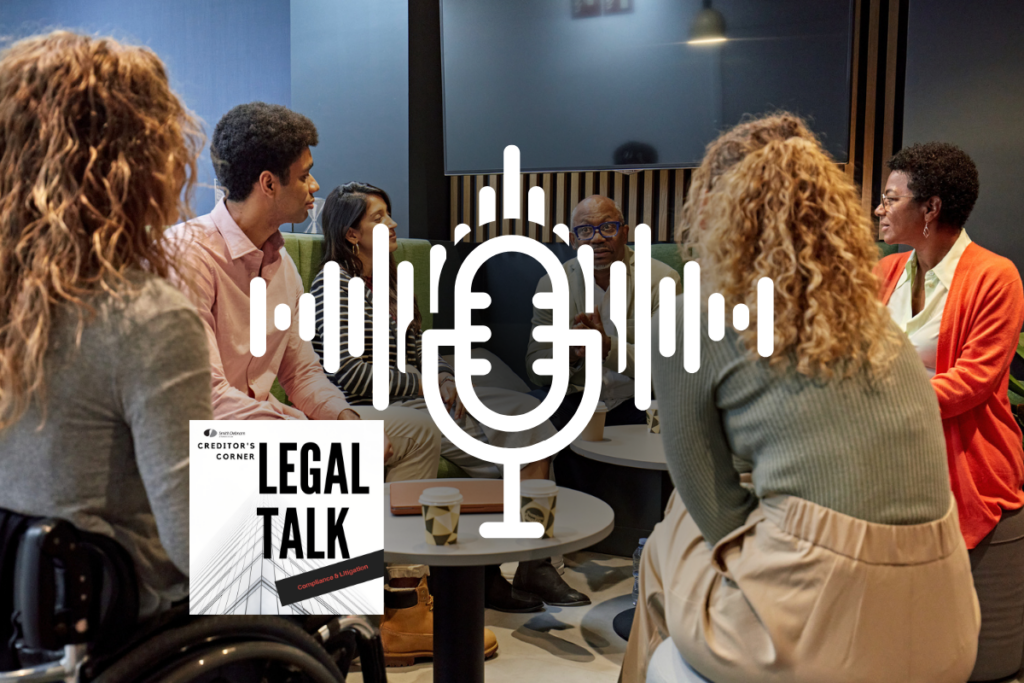If you practice in North Carolina or are involved in our court systems, you probably know that five counties have made the transition to e-filing. Those counties include Harnett, Johnston, Lee Mecklenburg, and Wake counties. In today’s episode, we discuss what you need to know as we transition to E-Filing across the state.


Navigating E-Filing in North Carolina
SUMMARY KEYWORDS
e filing, file, court, counties, North Carolina, attorneys, practice, documents, Melissa, hearings, pro se litigants, portal, rules, paper, transition, filings, easier, creditors, judges, require
SPEAKERS
Melissa Tulis Smith, Rachel Rogers
00:00
Rachel Rogers 02:48
Welcome back to the podcast series Creditors Corner Legal Talk, presented by Smith Debnam. Attorneys at Law, where we explore a range of legal topics impacting businesses, and private individuals, so be sure to hit subscribe so you never miss an episode. Before we begin, I want to note the information provided in this podcast does not and is not intended to constitute legal advice. Instead, any and all information shared is for general informational purposes only listeners should contact their attorney to obtain advice with respect to any particular legal matter. With that out of the way, let’s go ahead and dive into this week’s topic. My name is Rachael Rogers, and I am an attorney in the firm’s creditors rights section. I am joined today by my colleague, Melissa Smith, and we are going to talk about the recent switch to E-filing in some North Carolina counties.
Melissa Tulis Smith 03:47
Thanks, Rachel. I’m Melissa Smith, and I’m also an attorney and the creditors’ rights section of our firm and I’m excited to talk about E filing today. If you practice in North Carolina or are involved in our court systems, you probably know that, as of today, there are five counties that have made the transition to E-filing. Those counties include Harnett, Johnston, Lee Mecklenburg, and Wake counties. Rachel, now for someone who is not familiar with the term e e-filing, what exactly does that mean?
Rachel Rogers 04:25
So, E-filing is really a broad term that’s been used so far to describe just the general transition from paper files to electronic files by the court system in North Carolina. But in reality, it consists of two separate parts and particularly in the civil division, and everything the analysts are talking about today is geared towards the Civil Division of E filing not the criminal side of E filing. So, for the civil division of E The filing, there are two main websites that are used. They’re called E-file North Carolina and the E-court portal. This was kind of hard to get used to at first, but the E-file site is the web-based platform for all the electronic filings of the documents, all through a single secure, centralized online location. So instead of having to mail your pleadings and documents to the court or go down to the courthouse and get a file-stamped copy, you now just go online to E file North Carolina and upload the documents to your file, then the clerk will review it and handle accordingly, pass it off to the right department. The platform also allows you to serve the other parties by uploading onto the E-file site.
Melissa Tulis Smith 05:54
On its face, that all sounds really convenient. Is it mandatory to use E-filing in North Carolina?
Rachel Rogers 06:02
Yes, so that’s actually a really important point. If you are practicing, and one of the E-filing counties, even if you don’t live there, or that’s not where you know, Home Base is, you have to use E-file. If you’re making an appearance in one of those five counties, those courts will not accept your paper filings anymore. If you’re an attorney, if you’re pro se, the courts encourage you to use E-filing, but it’s not required. And it is important to note that all as of right now, there’s only five counties. But the long-term goal is that all 100 counties in North Carolina will be using E-filing
Melissa Tulis Smith 06:42
is for clarifying that. Rachel, I’d like to elaborate a little bit on the E courts portal, what exactly is the E courts portal that you mentioned?
Rachel Rogers 06:50
So the courts portal is really helpful for the public in general as well as attorneys. It is a site where you can search for court records, case information, hearings, judgments, and in some cases, you can actually make payments through the E courts portal. Melissa, I know you’re probably familiar with the program ViCAP that the courts used to have. This is basically the new ViCAP. So anyone can go online. Any person of the public, any attorney and you can search the online database by case name or case number and that portal will show you all the information, the parties information, the different case events, different filings, and you can actually click on all the things that have been filed in that matter and see them on the portal. It’s actually a really great way to be able to review a court file. Melissa, have you had a chance to use it?
Melissa Tulis Smith 07:54
You know, I have and there are a lot of benefits to using the portal. One being the 24/7 statewide access to all court employees, attorneys and even public users, you’re not limited to the eight to five business hours of the courthouse to access what’s going on in your file. Also provides web based access to all court records and documents really streamlines court administration in general, and provides greater case management ability. And our practice, we’ve also found that it’s a lot easier to pay via a credit card or debit card online rather than having to issue and mail out a paper check. We’ve also found that it has enhanced in disaster recovery, or at least has the propensity to enhance in disaster recovery, particularly important for our state of North Carolina where we are prone to hurricanes. And it’s great to have a platform to quickly inform both the public as well as court personnel of what’s going on with court dates or any other sort of stays that may be in place due to any sort of disaster. It also of course reduces paper forms which is great for the environment more green, more environmentally friendly, less waste and of course, more cost efficient, no need to spend money on as much paper or spend money on postage. The E-filing also encourages a more uniform procedure across all 100 North Carolina counties at will once it is in effect in all 100 North Carolina counties. That is our hope that it will really create a uniform procedure across the state. It also increases access to justice and to the courts particularly for you Pro Se litigants which we’ll touch on a little bit more later, and increases audio and video capabilities, which is awesome. It’s a hold over a little bit from COVID that I think the court system has found really enhances accessibility to justice. And, you know, judges can see files easier just right in front of them. So it has the propensity turn for faster turnaround times, which is great for everyone involved, because as they say, the wheels of justice turn slowly, so anything we can do to make them turn faster is a pro.
Rachel Rogers 10:36
Yeah, I totally agree on all those pros, it really, it really has its upsides, and I’m, I’m excited for when it hits all North Carolina counties, and everything’s really uniform. But you know, it’s not all rainbows and butterflies. Have you seen any issues or downsides to the E filing so far,
Melissa Tulis Smith 10:59
or there have definitely been some challenges during the transition of some attorneys, particularly attorneys who’ve been practicing with the paper filing, the old fashioned form of filing for decades for the duration of their practice, have not been particularly enthusiastic about the change being a requirement of the bar, that there’s simply no option to do anything. But e file, if you are a member of the bar is certainly required attorneys and their legal staff to take on extra work at the beginning, extra training to really get themselves up to speed on how to navigate e filing. So gotten a little bit of negativity from that Cuz nobody likes extra training, extra work. And that makes sense. And
Rachel Rogers 11:45
it’s definitely been a learning curve even within our office
Melissa Tulis Smith 11:48
100% get
Rachel Rogers 11:49
the hang of it. It works.
Melissa Tulis Smith 11:51
Absolutely. Similarly, I’ve encountered some judges who have met the change with what I’ll call a a lack of enthusiasm. I think it’s largely a matter of preference. But I’ve heard several judges express frustration in open court at trying to navigate the portal to find prior filings made the case in the middle of a hearing rather than simply being able to flip through the pages of a paper file to locate a prior filing. The transition has also temporarily at least slow down the courts where it has been implement min said can we expect this is a temporary issue. We’ve already seen the pilot counties wake Harnett Johnston and lean. We’ve already seen them kind of get over this hump a little bit.
Rachel Rogers 12:44
You know, Wayne County seems to be they’ve seemed to have gotten the hang of it so far. And I think that’s that’s a good representation of the end goal for down the road of the other counties.
Melissa Tulis Smith 12:57
I completely agree and wait County is a great test subject because it is such a populous county of being I think that I think the second most populous after Mecklenburg. So we did see, we didn’t see things slow down in those pilot counties at first, but everybody’s adjusting to this new way of doing things. But now we seem to have gotten more or less up to speed and we think it’s actually more efficient than it was previously. Of course, the the newest counties e filing and the most populous county in North Carolina Mecklenburg County just transitioned e filing in October, so just a month ago, so we’re still seeing pretty significant delays out there. But we expect that that’s just par for the course with them being in a transition period. And they will see the similar turnaround to what we saw in the pilot counties and after a few months of their local bar as well as their staff getting used to this new system that will actually prove to be more efficient than the prior system was. So hoping that will level out shortly. You know, all in all, I’d say the challenges of E filing have mostly just been the growing pains that you’d expect with any major transition.
Rachel Rogers 14:14
Yeah, I totally agree. And, you know, since this is the creditors corner, have you noticed any issues or pros or cons that are really relevant for creditors rights practice, and attorneys like we do in our section? Yeah, definitely.
Melissa Tulis Smith 14:32
So for a little context for our listeners, our practice, particularly mine and Rachel’s practice is predominantly high volume consumer collections and we practice across all 100 North Carolina counties. So since we practice across the entire state, one of the challenges we’ve faced during this transitionary period, is updating our processes and our forms. so that the correct documents merge for our E filing counties versus those still not E filing counties. So before E filing, we could apply a pretty much uniform approach and uniform process for all of our cases across the state. But now we have a different process different forms for the E filing counties versus the non e filing counties, which of course does pose some challenges. But all at all it we expect that the process will be more efficient once all 100 counties have transitioned e filing. However, however many months or years that transition ultimately takes beyond that, I think we’ve seen mostly benefits from E filing I you know, but beyond the the initial just growing pains and transitionary delays with our high volume caseload, it’s just easier for us to keep track of filings online, rather than having to track documents that are sent through the mail to be filed. I mean, that was a huge source of what would put us in a waiting pattern on a case we’d mail something out to the court, and then the court would have to receive it, process it file it, then mail it back to us. And if we’re talking about a county that’s a few hours drive away, that’s two weeks, maybe more that we’re just sitting, got a file on hold waiting for a document to come back filed. And now that process can be instantaneous, we file it and then we’ve immediately got that document file, file stamped and so much more efficient.
Rachel Rogers 16:33
And you know, we haven’t even mentioned this yet, but it also has really cut down on the paper that we’re having to use in the office, which is really great for a multitude of reasons. But even just being able to have an electronic file for core versus a paper file, because when you log into the portal, you can see every document that’s been filed. So the it’s really helped us cut back on some of our paper usage in those counties. Absolutely,
Melissa Tulis Smith 17:01
absolutely. I also want to talk on how it’s affected pro se litigants, which is a really important thing to our practice area. I can’t speak for the entire bar here, I’m just speaking as to what I’ve personally observed. But to me, it’s appeared that the E filing system and the E portal has actually been more accessible to pro se litigants. I know I’ve seen just as many if not more pro se responses filed. And I think that’s a reflection of the general public, finding it easier to file something online than to mail in a paper document, or drive down to the courthouse and to file it in person. I mean, if you think about it, from a practical standpoint, so few people even have printers, these days to print out a response to a lawsuit, it’s so much easier to do all of these things from the comfort of your home from a computer. Yeah,
Rachel Rogers 17:57
that’s so true. And I also, even recently, a pro se defendant in court was explaining how, by using the online portal, by filling in some of the prompts, it auto populates other prompts, so it really does help people who are not as well versed in the legal system, get the appropriate filings that they need in order to you know, continue on with their case in the in the court system. I think it’s really helpful for pro se defendants.
Melissa Tulis Smith 18:27
Yeah, I can I completely agree. And I know that’s not across the board that all pro se litigants will find E filing easier. I know some of us are out there old-fashioned and prefer the old-fashioned paper way. But again, we reiterate that that is still available to non-attorneys. It’s just not available for members of the bar to not E-file. And additionally, e filing enhances the audio video capabilities for cord straw for remote hearings are this is something that sort of started during COVID and then stopped a little bit or went backwards a little bit, we went more in person. And now we’re seeing a little more of an uptick because the fact that everything is online makes it so much easier for courts to also hold court sessions online. And I know personally, I’ve definitely seen an increase in pro se party participation on remote hearings as opposed to what I see an in person hearings. And if you think about it, it really makes complete sense. It’s much less time demanding to just log onto your computer. It doesn’t necessarily require taking time or a full day off work. It doesn’t require a pro se party to find childcare or to find transportation to the courthouse. Doesn’t require them to you know navigate parking as we all know, which can be a pain finding around any courthouse in North Carolina. You know, I’ve seen pro se litigants participate in remote hearings from the comfort of their own home or even sitting in a parked vehicle on their lunch break outside of their, their office, which is really great to just see that being more accessible to non members of the bar. And again, accessibility to pro se party is especially important to us and to our clients, because we deal with so many pro se parties in our practice area. And it’s a goal of ours that the court system is accessible to everyone and not just members of the bar.
Rachel Rogers 20:34
Absolutely. And we’ve talked a lot about the practical effects of the E-filing. But there also have been new rules issued regarding the North on E filing systems. Within the core, North Carolina rules, just general rules of practice, because it has changed a lot of the standing rules that are currently in place. The supplemental rules of practice and procedure for the North Carolina e filing project was codified on February 15, of 2023. And that can be found on the North Carolina courts website, those supplemental rules. So if you are practicing in these counties, make sure you check those out to ensure that you’re in compliance with all the new rules, we’re just going to talk about a few of the ones that stood out the most to us, as we were, you know, preparing for this change. One thing that the supplemental rules focuses on is what format the documents need to be in. You know, there were some rules regarding that when we you had to file physical papers, but there’s different requirements for uploading as well as different rules regarding the preservation of those documents. The new rules actually require that the E filer retains originals of each file document until a final determination of the case is made by the court of competent jurisdiction. And that’s a shall retain, not May. So it is mandatory. And that is something that we’re currently, you know, working out a good plan on how to handle that volume. So that’s just something to make sure you read over and make sure you’re practices in compliance with that. One thing that I thought has been really helpful is that the rules no longer require a cover sheet. For the counties that your E filing, in particular are specifically the rules state that by going through the process of E filing and filling out the necessary drop down options that substitutes and takes the place of the cover sheet. So that’s one less document you would have to worry about when e filing in those counties. And one of the pros that we talked about earlier that Melissa mentioned is that you can access these e file sites 24/7, which is amazing. But there is the question of, you know, the good ol old fashioned file stamp the date and time of when something was filed, for the purposes a statute of limitations and different deadlines. So the rules clarify that for the purposes of a filing date and time. The date and time that’s recorded on the receipt that shows the status of received is what counts. And just as a practical matter, when you do file something on the E filing site, you will get two emails in response. One email says it’s been submitted. And the second it will come later when it’s received. That received the second email is what will qualify as the filing date and time for purposes of any statute of limitations or deadlines. Lastly, the supplemental rules also provide guidance on how to submit proposed orders for the judges review. And I know Melissa mentioned this also. But this is one of the things that I think has been the most helpful and beneficial for E filing is that when these proposed orders while we’re in the hearings, even if they’re virtual, the judge will can just sign it right on the E filing site. And we don’t have to wait weeks for it to arrive in the mail, which is great. And Melissa has probably heard me say this, I have been telling, you know everyone in our office to interact with the court staff to just remember to be patient with the court staff during this transition period. Because it’s a lot and it’s a lot of change. And everyone’s working really hard. So just always remember to be kind and patient with the court staff when you’re interacting with them.
Melissa Tulis Smith 24:53
I completely echo that sentiment I mean I speaking especially for Wake County as that’s just where we’re our offices Situated I know the Wayne County staff have been pulling some long hours to make this transition easier for us as members of the bar. And we’re very grateful for that. And the best thing we can do is be patient with them. While they’re, they’re still figuring it out too, just like we are. For more information on the North Carolina e filing system and process, you can find plenty of resources at the North Carolina courts website or on the E courts page.
Rachel Rogers 25:31
Great. Thanks so much, Melissa, for discussing e filing with me. And thanks to everyone for tuning in and listening. Make sure to check out the other episodes. And if you have any questions, feel free to reach out to us. You can find our contact information at www dot Smith. Debnam law.com Thanks, everyone have a great one.
25:53
ABOUT
Creditor's Corner
Smith Debnam’s Creditors’ Corner Legal Talk Podcast Series explores regulatory and litigation trends impacting the consumer financial services industry. Become well-versed in state laws, federal laws, news from the supreme court, and the latest updates and trends in consumer financial services litigation. This podcast is a must-listen for those working in financial institutions, consumer finance, consumer credit, mortgage servicers, auto finance companies, litigators, and more. Listen to great topics on consumer protection laws, regulatory compliance, and consumer lending, as well as legal updates in the area of Tax Law, Trusts & Estates, Real Estate Law, and Equipment Leasing and Finance.
Hosted by Smith Debnam’s experienced legal team – this podcast provides practical analysis and helpful insights from leading attorneys in their respective fields of law.





